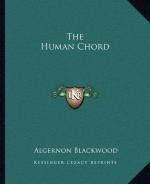“To make you feel absolutely safe from possible disaster,” Mr. Skale was saying with a smile, “you shall have the assistance of the violin. The pitch and rhythm shall be thus assured. There is nothing to fear.”
And Miriam, equally smiling with confidence, led her friend, perplexed and entangled as he was by the whole dream-like and confusing puzzle—led him to the armchair she had just vacated, and then seated herself at his feet upon a high footstool and stared into his eyes with a sweet and irresistible directness of gaze that at once increased both his sense of bewilderment and his confidence.
“First, you must speak my name,” she said gently, yet with a note of authority, “so that I may get the note of your voice into myself. Once or twice will do.”
He obeyed. “Miriam ... Miriam ... Miriam,” he said, and watched the tiny reflection of his own face in her eyes, her “night-eyes.” The same moment he began to lose himself. The girl’s lips were moving. She had picked up his voice and merged her own with it, so that when he ceased speaking her tones took up the note continuously. There was no break. She carried on the sound that he had started.
And at the same moment, out of the corner of his eye, he perceived that the violin had left its case and was under the clergyman’s beard. The bow undulated like a silver snake, drawing forth long, low notes that flowed about the room and set the air into rhythmical vibrations. These vibrations, too, carried on the same sound. Spinrobin gave a little uncontrollable jump; he felt as if he had uttered his own death-warrant and that this instrument proclaimed the sentence. Then the feeling of dread lessened as he heard Mr. Skale’s voice mingling with the violin, combining exquisitely with the double-stopping he was playing on the two lower strings; for the music, as the saying is, “went through him” with thrills of power that plunged into unknown depths of his soul and lifted him with a delightful sense of inner expansion to a state where fear was merged in joy.
For some minutes the voice of Miriam, murmuring so close before him that he could feel her very breath, was caught in the greater volume of the violin and bass. Then, suddenly, both Skale and violin ceased together, and he heard her voice emerge alone. With a little rush like that of a singing flame, it dropped down on to the syllables of his name—his ugly and ridiculous outer and ordinary name:
“ROBERTSPINROBIN ... ROBERTSPINROBIN ...” he heard; and the sound flowed and poured about his ears like the murmur of a stream through summer fields. And, almost immediately, with it there came over him a sense of profound peace and security. Very soon, too, he lost the sound itself—did not hear it, as sound, for it grew too vast and enveloping. The sight of Miriam’s face also he lost. He grew too close to her to see her, as object. Both hearing and sight merged into something more intimate than either. He and the girl were together—one consciousness, yet two aspects of that one consciousness.




